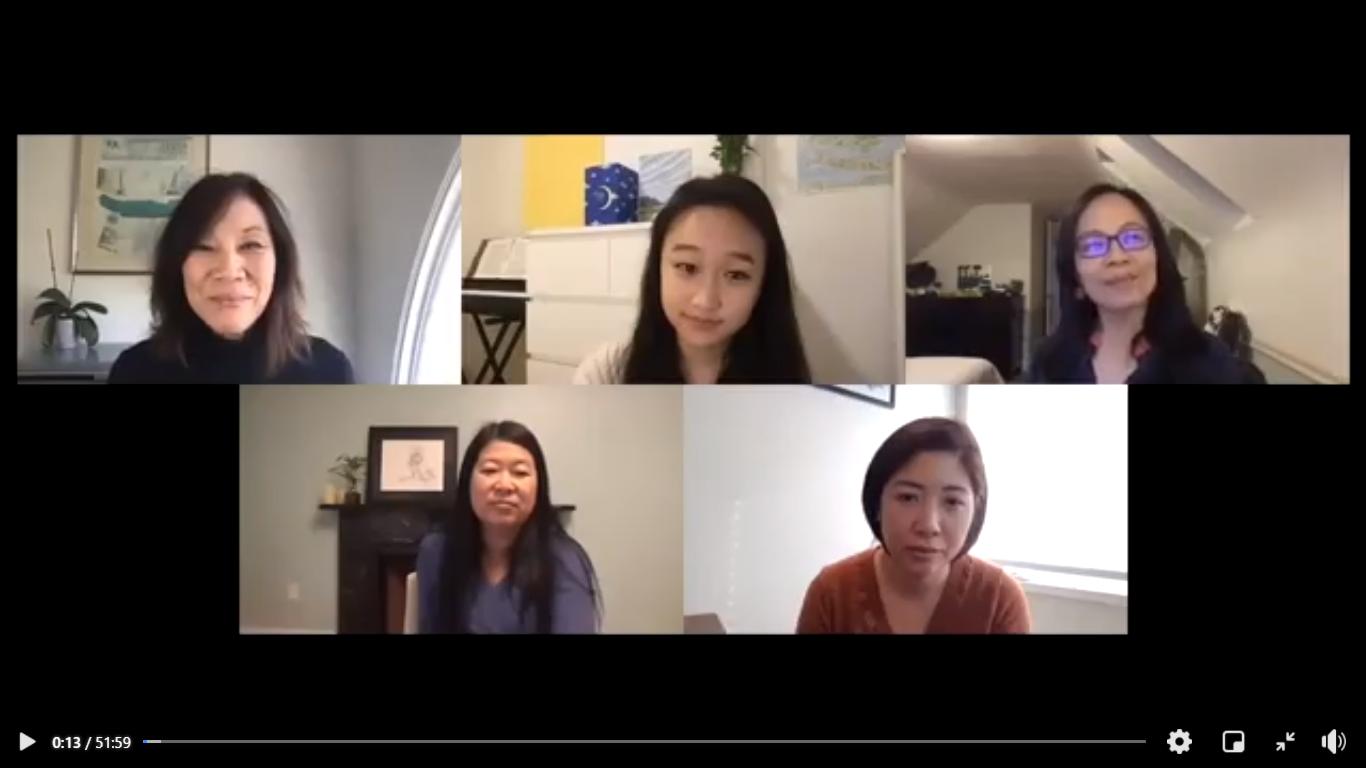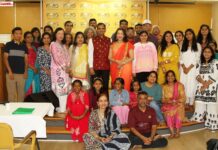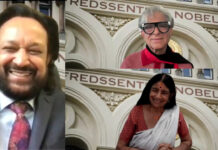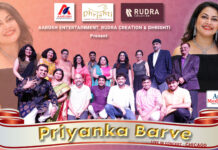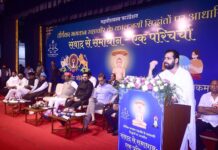Lakshmi Iyer
Asian Americans, once just side characters in films, are getting their due on screen. This year, Chloe Zhang broke into history books as the first Asian American female director, and a woman of color to win the Academy Award for Best Director for her feature, “Nomadland”. And South Korean veteran Youn Yuh-Jung won the Best Supporting Actress award for her role in “Minari”. Last year, too, South Korea made a huge splash at the Academy Awards, taking home the trophies for Best Picture and International Feature Film with “Parasite”, and its director, Bong Joon Ho won the award for Directing.
Netflix released a new animated film, “Over The Moon” in late October last year. The film is unconventional, telling the story of a young Chinese girl, Fei Fei, who has a dream of going into space.
Janet Yang – executive producer, Gennie Rim – producer, Peilin Chou – producer, Cathy Ang – lead actress who voiced Fei Fei, met for a panel discussion over Zoom last year with Nielson host Patricia Ratulangi, talking about subjects such as their motivation for working in the film and the importance of diversity on screen.
Patricia: What was your inspiration for working in this film?
Janet: I have my entire life wanted to see more of characters on screen that looked like me. I was deprived of that when growing up. And after college, I decided to go live in China for a while and I discovered all this talent in front of and behind the camera. So I was bringing Chinese films over, and had an opportunity to start working on films that led me to the notion of power of producer who can decide what to see on screen and what is heard on screen and once I gathered those tools and started producing movies, then, of course, I thought we need to bring more Asians.
Of course, it requires a paradigm shift on behalf of a lot of people – the old Hollywood system very much favored heroes who were white men; but, occasionally, I would find a project like “Luck Club” or whatever.
And then, about five years ago, Peilin was running Pearl Studios in Shanghai, and she invited me and a few others to think about ideas for animation and animation is, of course, very liberating because you can completely create a fantastical world.
And I had always thought about this Moon Goddess, Chun Um, and how perfect a story can be built around her, because she’s been up there in the moon with this bunny rabbit which is so cute, and every year, people still honor her with moon cakes, and I knew there was something there…
A contemporary story would be a lot more relatable, so I created a story around a girl who is from a moon cake making family, and who loves moon cakes, and decides she must go to the moon, build her own rocket ship to the moon because we know girls can do things like that, not just boys; and off she goes!
And I think that’s the kernel that started this process. It was a very particular and right environment for doing so at the time because it was a company that was created in China which could really absorb a lot of Chinese talent and could help maintain authenticity of the story while there were people who had a very international perspective, so we knew what would likely be a very appealing global story.
Peilin: I was sitting in the room when Janet showed this amazing idea and I immediately got very, very excited. The moon festival is definitely something I grew up with and I feel it’s really personal to me and my family and the opportunity to share it with a worldwide audience just seems really amazing. And particularly seen through the eyes of this little girl who, you know, is a believer and is smart and uses her mind and her determination to accomplish anything that she can dream of. It just seemed like a really incredible project.
And so we quickly decided we wanted to develop it and kind of nurtured it at Pearl and developed it along with Janet and we brought on writer Audrey Wells to write the project and it was really, really a special project for Audrey. She connected with the main character right away and she kind of has a whole career writing really strong female characters.
So there was so much that she brought to this project from her personal perspective. And she turned in a first draft of the script that was one of the best first drafts of any script I’ve ever read in my career. It really just blew me away. It was so wonderful and emotional.
And so then we had to dash off and find a director. And that’s when we shared the script with my team, our director and Gennie Rim.
Gennie: How it came about was that Glen and I had just finished a short film called “Dear Basketball” with Kobe Bryant and we brought it to NSC in 2017. And Glen gave this amazing presentation on really his philosophy of creativity and really living and about thinking like a child.
We are blessed to have Peilin and Melissa Cobb who is now head of “Kids and Family” at Netflix, but at the time was at Pearl Studio with Peilin and they listened to Glen’s presentation and I think Peilin said, “I just feel Glen was speaking to me and saying I want to direct this film!” And Peilin right after reached out, wanted us to hear about the project, invited us to read the script.
And I just cut to twenty pages into the script, I was like in tears, and I was like…”I have to do this film!”
My whole life I felt led up to this film, and to tell the story about this amazing 12-year-old Chinese girl living in China who believes she can make it to the moon to prove that her Moon Goddess is there. And she does it with her own stubbornness and determination and her intelligence, her incredible intelligence!
And I just loved everything about it and Glen fell in love with Fei Fei as well. He always talks about how all the characters he’s ever animated or created, he loves them and their spirit of believing the impossible is possible and Fei Fei is clearly that as well.
So we said, “Yes!” And then, next day, we were, like, on a plane to Montreal, starting to figure out our teams and everything, and it was really, it was such a wonderful journey.
Patricia: I think I saw in one of the teaser videos Glen talking about how the musical anime, the genre really lends itself to emotional storytelling right? Which, Cathy, that’s where you come in. I’d love for you to tell us the story about the sweet song that we hear, “Rocket to the moon”, and how that came to be.
Cathy: Well, I had actually gotten the privilege of working with Gennie on a different project on a Google spotlight story before she brought me in to do some of the demos of, actually, the entire movie. We did the scratch record of the whole movie when they were still storyboarding. So I got to meet the team really early on, and watch them create this piece. Well, we really did it together and I was very, very lucky to be there from the get go and understand how to bring this character to life.
And when we were doing the demos, I got to get into the studio and we did the entire scratch report of the whole movie in one day and so, I had just been living in Fei Fei’s character for the whole day. And then, at the very end of the session, we recorded “Rocket to the moon”, which, having had her words in my soul all day, I just really connected with her and the music and everything she was bringing to that song. I mean, you’ll see in the movie, hopefully (laughs).
But you can really see Fei Fei just pour her heart out and just talk about how much she cares about her family, and then, use that love to motivate her to do the impossible.
As all these people have said, we watched her try, try and try again to build this rocket. And she fails multiple times but she never gives up because of her determination and her love. And so, everyone…everyone can feel the emotion in that song.
And I just connected really hard with Fei Fei and that take is what’s in the movie that day from that scratch record, because I think everyone could just feel Fei Fei that day. And then, they brought me on officially (laughs).
Peilin: I just have to give props to Cathy because that day, not only did it come from that day, but it was her very first take that day, and also, sitting in the post production of it, it is one continuous take.
We did not piece it together from different takes. We did not even tune her; she was so perfect in every way, so it was just radiant sun of magic that day!
Patricia: That’s amazing! It was the spirit of Chungma, the spirit of Fei Fei, it was all-together in that one magical moment, right?
Cathy: And we just held on, and from there, it took off. The character was really built by all the people here.
Patricia: That’s an amazing story…makes the hair on my neck stand as well, because this is the impossible being possible. So what was it like watching the film with your family the first time?
Cathy: For me, it was…it was one of the proudest moments of my life. I think, ‘Oh!’ I am so emotional about it! But, you know, most of my family lives in California and they don’t necessarily get to see the art that I create often, and so, having everyone together, even if it was just on a Zoom, be able to share in this, you know, like this was really for them, and being able to see my cousins and their kids watch the film and watching those kids erupt into cheers when Fei Fei took off and also, seeing my cousins watch their kids and understand that, “Oh, this movie is for them!” I could see how much it touched them, too.
It was just a very, very special experience to be able to share my heritage with them and just really feel very connected in a time when we are very isolated.
Patricia: I follow a group, “Subtle Asian Treats” on Facebook and you have a lot of props there (laughs along with Cathy). And Gennie, you have done a lot of animated projects, right? And this is the first one that is very Asian, so what was the reaction from your family and friends?
Gennie: My personal connection to this is that I come from a blended family and I have a stepfather. I am also a stepmother – my husband has two sons from a previous marriage.
But I think that what we all saw was that, just, “That’s our family!” That’s our journey of just how we learn to be open and grow with each other.
I think that was the big takeaway for us. And also because she grows up in a moon cake bakery – I love that, because my family had restaurants growing up so I…by the time I could walk, I was busing tables and we were always in the family business of always being together and we love that aspect of Fei Fei. Life will have its rhythm with having a restaurant where you wake up, you go open the restaurant, you have a whole day there and then you close the restaurant and you go home and have your evening. It’s this rhythm every day no matter what happens.
With Fei Fei, these emotional, very heavy things happen but there’s this constant thing that there’s this family business and my family just really loved that and all of the food, the family dinners, I mean…that’s my family (laughs). Like the camaraderie and the conversation and the cooking together. It’s one of…it’s what we do as a family. There’s not one event where we are all not cooking together so when they watched it, they felt so much of their lives reflected in this animated feature, which the whole world now gets to see, which is a wonderful, wonderful feeling.
Patricia: That’s amazing. Janet you started talking about how you wanted to see yourself in movies, right? Any particular thing that was called out by your family or for yourself as you were watching the movie for the first time?
Janet: I think one of the greatest pleasures of a project like this is that you discover talent like Cathy Ang. Seriously that is something so rewarding that she is now a role model for other people. There’s nothing more pleasurable than having that opportunity.
And for everyone, I have always felt that what we need is to humanize underrepresented people. So it doesn’t necessarily have to be Chinese though in this case, it is, but anyone who feels that they are not being seen, heard or understood, and to realize that this 12 year old girl living in a water town in China has so much in common with so many other people. And that I think helps break down barriers that people might have constructed in their mind but not even aware of.
So the universal themes about family, and of food, of dreaming, of being able to stay committed to your dream, I think that’s a great message for anyone. And the fact that she happens to be a Chinese girl is very particularly special to those who barely get to see themselves.
So yeah, it’s what’s happening on the screen and it’s also happening behind the scenes like finding a Cathy Ang to blast out to the world. That to me is just a wonderful thing.
Patricia: And what about you, Peilin, what resonated with you the most as you were watching it with your family for the first time?
Peilin: Well, I have to say my family kind of saw it all along the way (laughs). So it wasn’t this moment where it was done. And especially, I have two boys that are 10 and 13 years old and you know, they got to see various steps of the whole process; they have a personal connection to Cathy (laughter) so they are just so proud to know Cathy! It’s Cathy! It’s Cathy! So, that was very, very exciting to them as well. But I think, for me, what has been so moving now that the movie is out in the world is that it’s not just responses from my family and people I know but so many responses from people I don’t know. All these responses from Asian girls and parents and people out there that are sharing how this film has moved them and how they feel seen by this film.
And Michelle Yang, this journalist, wrote this amazing, beautiful opinion piece about how in 2020, in this year that’s been really difficult in this country to be Chinese, she found comfort and solace in this movie, and what it meant to share it with her children. To me, that’s everything. That’s really kind of what my hopes and dreams are for this film, what it’s all about.
Patricia: Yeah, and one of the things we have seen at Nielsen is also that as expected, animations like this, tends to bring two plus, groups of more than two people watching this together. And that’s such a needed balm for these crazy times that we are all living in.
So that’s actually a good transition into this question. You mentioned about your sons watching Cathy and knowing that it was Cathy behind it, right? Why is it important to have this type of content that resonates and touches young children, the Asian young children?
Peilin: You know, I felt growing up, similar to Janet that I never saw anyone that looked like myself and it really had such a profound impact and you know, in the sense that, you know I grew up wishing I wasn’t Chinese because I never saw myself and the people that were the heroes and were doing fantastic, amazing things… they never ever looked like me.
And I think that to have to grow up that way is really so sad! And, you know, I often talk about…I made this film for my 10 year old self in a way, and for my children, and for all children to come to be able to have a role model, to have somebody that they can look up to, and ‘Wow! She’s amazing and I want to be just like her!’
That’s really what it is all about.
Patricia: That’s great. Gennie, I don’t know when you were talking about your blended family, what would it mean for your kids and your husband’s children watching this?
Gennie: Yeah, I think for me and my 10 year old self, that it was okay to know that families will change and it’s not unusual that your mom may find a new partner that is her life partner and I think that was a big thing.
And definitely, all those…exactly what Janet and Peilin said about feeling different. I felt that one, being Asian, and then also, that my family was different because I didn’t have a “normalized” family. But to see this and saying it’s about opening yourself up to love and love will always be this evolution and it will be changing. And there will be moments of grief and pain. But there’s always more love on the other side of it if you can let yourself be open to it.
And then, when I came into my husband’s life and I saw these two boys that were feeling probably the same thing I felt when I was going through. I understood from a very deep place that they were going to go through this evolution of understanding and healing and what does that mean to be family.
I think we definitely have this very evolved definition of family and that it really is about being loving and being open and that everybody wants to feel loved and everybody wants to receive love and also, be open to giving love. So I don’t know if this really answers the question but really, I think this film is all about healing, and speak to Audrey, that’s always what she wanted with this film – that people could leave knowing that they are a little bit more understood and healed through this.
Patricia: You just brought tears to my eyes. And I would say it spoke personally to me, too. I lost my mom two years ago and you know, food and culture and watching her cook and be with her and that movie, watching that family be together reminded me so much of that. I mean, she was the same way. She said love conquers all, right? And that connection goes beyond the earthly existence that we have. And your movie is bringing that to everybody, regardless of their background and heritage.
Janet: I don’t know if this is an appropriate time to say…of course, Chang’e is the actual Chinese name. If you take away the apostrophe, it spells ‘change’. And I have thought about this, being an agent for change because we all have to live with so much change in our lives. We are really completely in control. The parent dies or so many other things happen so to me, it is also about how you adapt to change.
Even the idea echoed more with what Pelin and Gennie said, I never in a million years imagined growing up that I could work in the movie business. It seemed like such a far fetched notion. That was a dream. I loved movies but it seemed impossible to even imagine that I could be doing what I am doing now. So that’s where I think change and dreams come into play and I hope this movie helps people keep their dreams alive.
Patricia: So Cathy, being an inspiration for younger audiences, how does that feel?
Cathy: It’s amazing! It’s definitely…it’s a lot of pressure. We’ve talked about this before but it’s also because now, a voice maybe, a growing voice in the Asian American community, I feel the pressure to do them right and to represent them in a way that always feels true to who we are. And that thing, that’s a lot of different kinds of people. I think what’s really different about this movie is that we get to see two very complex Asian characters.
And I think even while we have had some kind of representation, it’s usually very few, previously, like, you know, before, and also, they are meant to represent one maybe very stereotypical Asian character that is often…it doesn’t matter. They are not full human beings. So, like Janet said, we are trying to humanize us and also present why you can’t relate to us.
And I think it’s very exciting to see a young girl who is flawed, but she’s flawed because she’s experienced something so difficult, so it takes her time to grow and actually getting to go on that journey with her is incredibly inspiring. Of course, she is going to be a role model to people. And I am so proud that we can present this character to the world because, you know, whatever heritage you have, I think Fei Fei will inspire you and that’s exciting because all the kids who see themselves in her will feel very celebrated.
And so, I definitely feel the pressure to live up to that. But I am inspired by Fei Fei as well so I hope I can live up to who Fei Fei is. I am excited; I am excited to see how she changes the world.
Patricia: And I think that’s one of the key messages from the film, at least that I took away that it takes a whole village, right? It takes your family, it takes…even up on the moon, it takes the whole…fun people around you to make things happen, to bring that change about.
So one of the things I’ve been wondering is, given that there’s been this shift, you know, “Parasite” winning the Oscars and there’s been more call for diversity across Hollywood as well as on television. What do you think really needs to happen in order to make this change stick and to keep this need for change top of the mind for people?
Janet: I’ve been very loved by the Academy and actually, I am Chair, Membership of the Governance Committee. I am a governor and we talk a lot about this. There’s actually been, what I think is a real pivot and pretty much all the studios and streamers and major production companies fully recognize that it is time to really celebrate more women and people of color and four years ago, we started something called the H2020 initiative which doubled the number of women and people of color in the membership. And we are starting a new initiative.
But this is not something we are doing alone. There’s a lot of buy-in from financiers and I do feel that there’s a strong commitment to doing this and I know Netflix has really been very much at the charge of really seeing that these changes are executed and so many others in the list. Now, there are so many things that are being developed and being made.
And I finally feel it is possible to make the things I want to make without having to adjust them, without having to whitewash them or make it more palatable to a different kind of audience because we are they and they are us and these stories are universal and it’s okay to make it very, very authentic but still maintain a kind of global appeal as hopefully, “Over the Moon” does and seems to have.
So, I’ve been around longer than everyone else on the screen here and I have seen radical changes actually. And I think the streamers have a lot to do with that because they really do care about audiences all over the world. It’s not just how many people you can pack into an audience the first weekend in a theater at the same time, same place. So there’s a lot more support for much more inclusivity and we are all very grateful for that.
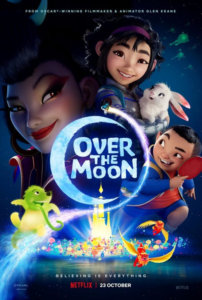
Gennie: I was just a fan girl for a second. Janet, I just wanted to say I so appreciate all the efforts that we know are happening behind the scenes, in front of the scenes to push for films like ours. You know, it’s not just like let’s make this movie. It’s like years and years of people pushing and having those really hard conversations that are about why it is important. And to a point where there was probably no even conversation, it was just like, “No, we are not doing that.”
No, there’s flexibility in those conversations. You can actually have meaningful, thoughtful discussions about why it’s important and to be heard so I applaud all of the efforts. You and everyone else who are pushing for this. It’s really amazing. Thank you!
Peilin: Well, just to say, actually, maybe a shout out to Netflix because they have done so much on this front in terms of the desire to tell these types of stories. I feel like “Over The Moon” was something Netflix that immediately wanted to do and it was never like, “Well, okay, I mean it’s a Chinese story but it seems kind of universal so we’ll do it even though it’s Chinese.” It was much more like, “We want to do it because it’s Chinese.”
And we want that voice, those unheard voices and we want that diversity and I think that’s so central to what Netflix is doing and what their mission is about. And, you know, I do think what Janet said about those streamers with Netflix at the forefront of why there’s really so many additional opportunities and platforms and places to be telling stories. So I think that’s really, really exciting.
Patricia: I love hearing that. What in the past seemed impossible seeing Chinese people, Chinese actors, as well as Chinese storylines was almost stereotypical. You see the kung fu films, you know. But now, it goes way beyond that. And maybe, is there a message here? Cathy, I am going to turn this over to you.
For those young Asians who might be out there thinking “Oh, I’ve been told I need to be an engineer and that’s it!” (laughs) Or “I need to be a doctor” or “I have to be a certain way” because of whatever you’ve been told. How do you get above that? How do you go and define what that dream is for yourself and go for it?
Cathy: I would say… just remember to reach out to the people who have paved the way for you. I mean I think that the doors are opening and the community that I’ve been able to meet is so welcoming. And just like, look at this panel. It’s all these women who are trying to lift all the other people up and make sure that their stories are told.
I think just stay true to yourself, try and discover who you are. If you have found that you are passionate for the arts, create and really just begin to share. We are lucky because we have all these different platforms to share these stories.
And what we are realizing is really, the Asian American, the Asian American Pacific Islander community is really trying to come together in the last few years, well, decades. But, I feel because of the Internet, we are able to do it so much more easily. And we are supporting each other. And so, even if you, you know, you have immigrant parents who may not want you to pursue the arts, there’s plenty of people who can maybe help you understand how that could be a feasible option. You just have to make sure to connect with the community and really keep at it.
I am obviously living a dream come true and it takes so much luck but also, there’s people here who want to help you and that’s a gift. You know, so use that absolutely.
And I think one of the biggest reasons why it’s hard to imagine for these parents for their child to go out to the arts is just because they don’t have a lot of examples.
And so, movies like this where we’ve seen an all star Asian cast with Asians behind the table, you know, it shows us that it can be done. Hopefully, that concept, that notion, that you can pursue your passion and dreams, will slowly fade away because it is possible. It really is possible.
Patricia: What is the one takeaway that you hope people will get from watching this film?
Gennie: so many things, but I think that right now, with everything that’s going on in the world, that they find a little joy and healing. We deal with grief in the film. That’s a very heavy topic but we go through it directly and we get on the other side of it. We are saying to everyone who may have experienced grief that you are not alone. It’s a very lonely process when you grieve but you are not alone and that love is all around you if you are open to it.
Peilin: I would say it’s a similar message in a way. Audrey Wells who wrote this script, she passed away during the making of this movie and she really wrote this film as a love letter to her daughter and her husband. The two things that were so important for her that she wanted to leave behind was for her loved ones to know that even though she couldn’t still be with them, that the love that they share lasts forever as you see in the film.
And having lost someone doesn’t mean that you can’t live a full life and it doesn’t mean you can’t have joy and if you open your heart to what’s around you, there can still be so much joy and wonder in the world and I think those two messages were really what Audrey wanted to share and they really resonate with me as well. I just hope that for anyone that might be struggling or facing challenges, that the film inspires them, comforts them, maybe makes them feel a little less alone.

